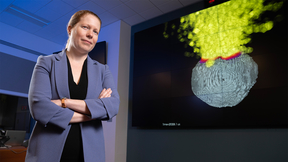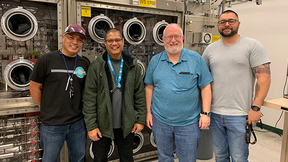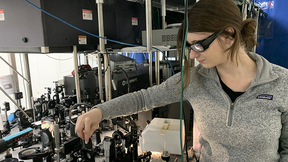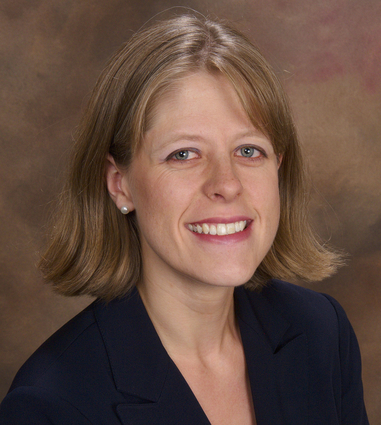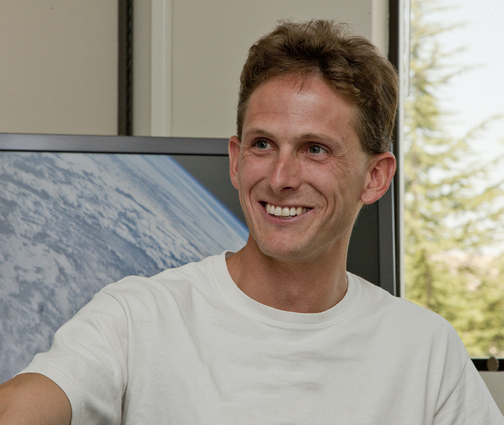Two Livermore scientists earn early career presidential award
Whitley is working on research related to the transport processes in dense plasmas, such as those found in the National Ignition Facility (NIF) where fusion energy experiments are conducted.
Whitley was chosen for her work using path-integral Monte Carlo techniques to produce accurate quantum statistical potentials for use in molecular dynamic codes, for applying these methods to first-principles understanding of thermal conductivity in ignition capsules for the NIF, and for service to the Laboratory Postdoctoral Association.
A native of New Mexico, Whitley graduated from New Mexico State University in Las Cruces in 2002 with a Bachelor of Science in chemistry, and a Bachelor of Arts in French, along with a minor in physics.
She received her Ph.D. from UC Berkeley in theoretical chemistry in 2007, after being awarded a National Defense Science and Engineering Graduate fellowship.
Her work as a postdoc at LLNL began just 11 days after she filed her doctoral thesis. She was hired into the Quantum Simulations Group in the Physics and Life Sciences Directorate, studying semiconductor nanomaterials that could be used in solar cells.
She has now joined the Weapons and Complex Integration Directorate, working on burn physics and molecular dynamics. In her spare time, she dances with Livermore's Valley Dance Theatre, and is engaged to be married next summer.
Jeffrey Banks, a computational scientist, was selected for work in computational physics, scientific computation and numerical analysis, especially pioneering contributions in numerical approximations to hyperbolic partial differential equations focusing on the development and analysis of nonlinear and high-resolution finite-volume and finite-difference methods, and for service in high schools and the scientific community.
In lay terms, Banks says: "My research is about using computers to simulate problems from the physical sciences; and I work on the basic mathematics needed to continue expanding our simulation capabilities."
While Banks was aware he had been nominated for the prestigious award, "I was surprised and honored to be selected for a PECASE award."
Banks' work to improve computer simulations is important to national security research, notably fusion experiments at NIF vital to the National Nuclear Security Administration's program to ensure the safety, security and reliability of the nation's nuclear deterrent without underground testing. NIF also serves as a fusion energy test bed.
Banks is particularly interested in wave problems such as those often found in fluid dynamics or electromagnetics.
In addition to his LLNL research, Banks tutors high school students with the goal of making math more accessible and less intimidating. Banks, a pole vaulter in high school and college, also coaches track and field at a local high school. He met his wife, now a high school math teacher, on the pole vault runway at Rensselaer Polytechnic Institute .
Banks received his Ph.D. in applied mathematics from RPI in May of 2006 and has been an employee of LLNL since February 2008, first as a post-doctoral fellow and then as a member of the technical staff. He also completed his undergraduate and master's degrees in mathematics at RPI.
PECASE winners receive $50,000 a year over five years to pursue research in their field. Both researchers have been able to pursue the science for which they were honored thanks to LLNL's Laboratory Directed Research and Development program, which funds ideas with potential benefits for DOE/NNSA missions.
The PECASE awards ceremony was held today (Tuesday, July 31) at the Smithsonian National Museum of Natural History in Washington, D.C.
Contact
Donald B Johnston[email protected]
925-423-4902
Related Links
The White HouseNational Science Foundation
Tags
ScienceFeatured Articles
